Water is essential for all living beings, including our little ones. As parents, we always strive to provide the best for our babies, ensuring they grow and develop optimally. In this article, we will explore the benefits of baby water, specifically designed for our precious bundles of joy.
This content will dive into the importance of hydration, the unique needs of infants, and the advantages of using baby water over regular tap or bottled water. By the end of this enlightening read, you’ll be armed with the knowledge to make informed decisions about your baby’s hydration, giving them the best start in life.
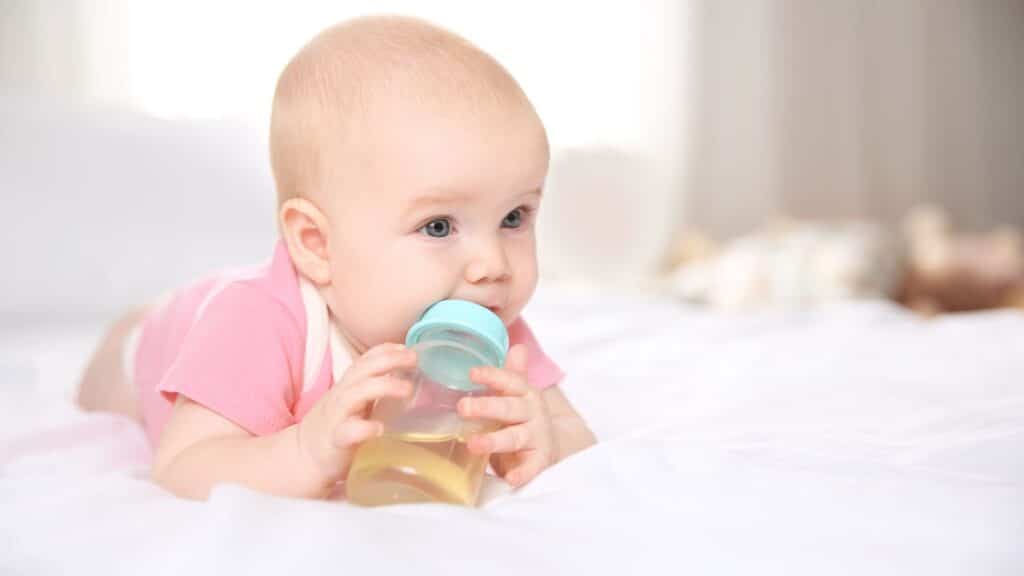
At What Age Is It OK to Give Your Baby Water?
As new parents, we often find ourselves asking countless questions about our baby’s needs, including when to introduce water to their diets. Ensuring healthy hydration is crucial, but when is the right time to start offering your little one water? With keywords like breast milk, baby water, infant formula, and tap water floating around, it can be overwhelming to find the right answer. This column will shed light on the appropriate age and guidelines for giving your baby water.
For the first six months of life, breast milk or formula should provide all the hydration and nutrients a baby needs. Babies under six months typically don’t require any additional drinking water, as breast milk and infant formula offer all the necessary nutrients for their growth and development. Introducing water too early may interfere with your baby’s milk supply and could lead to fewer wet diapers.
However, as your little one grows and begins to eat solid foods, usually around six months of age, you can start offering sips of water [1]. A small amount of water can help young babies stay hydrated, especially during hot weather. At this stage, it is best to use a sippy cup to help them transition from breast or bottle feeding to drinking from a cup. As your baby grows, it will gradually consume more water alongside breast milk or formula.
When choosing the right water source, baby water or boiled tap water is the safest option for babies under one year old. Tap water can contain impurities and bacteria that may be harmful to young babies. Boiling tap water for a minute and then cooling it will help kill any potential contaminants. Bottled water can also be used, but it’s essential to ensure it is low in sodium and free of impurities.
Breastfed babies tend to need less water than those on infant formula, as breast milk provides more efficient hydration. However, monitoring your baby’s hydration levels is still essential, especially during hot weather or if they seem unwell.
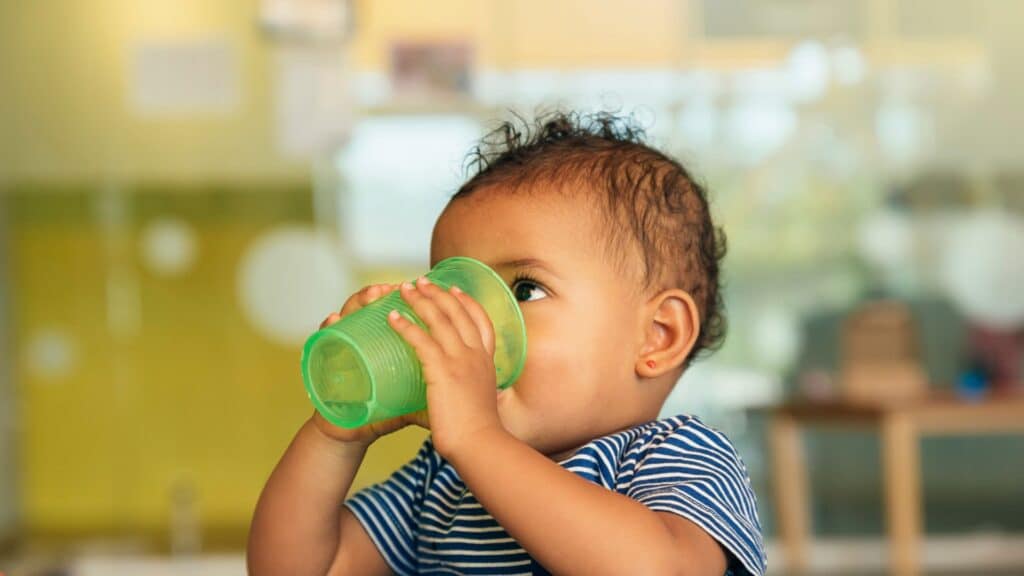
How Much Water Can My Baby Drink?
As we transition from discussing the appropriate age for introducing water to your baby, it’s equally important to understand how much water your little one should drink to maintain a healthy balance. Ensuring the right amount of water intake is crucial to keeping your baby hydrated while avoiding overhydration and water intoxication. Let’s discuss the recommended water intake for your baby, considering factors such as age, diet, and individual needs.
As mentioned earlier, breast milk or formula should be the only food and drink source for your baby during the first six months. Breast milk provides all the nutrients, hydration, and calories needed for growth and development. For those using powdered formula, make sure to mix formula according to the World Health Organization’s guidelines, as over-diluting or under-diluting can lead to insufficient nutrients or dehydration.
Once your baby reaches six months and starts consuming solid food, you can offer small amounts of water alongside their meals. At this stage, a few sips of water from a sippy cup will suffice, ensuring they receive enough fluids without disrupting their milk supply. As your baby continues to grow and consume more solid foods, their water intake will naturally increase. It’s essential to adjust their water consumption according to their age, diet, and activity level.
For older babies (between 6-12 months), a general guideline is to offer about 2 to 4 ounces of water per day. However, it is important to remember that individual needs may vary, and it’s always best to consult your pediatrician or local health department for tailored recommendations.
Avoid giving your baby sweetened drinks or fruit juice, as these can lead to excessive sugar intake and potential dental issues. Furthermore, these beverages can fill your baby’s stomach, reducing their appetite for breast milk, formula, or solid foods that provide essential nutrients.
It’s essential to closely monitor your baby’s body for signs of dehydration or overhydration. If you are unsure about your baby’s water intake, don’t hesitate to seek professional medical advice. Establishing healthy habits early on will set your baby up for lifelong well-being.
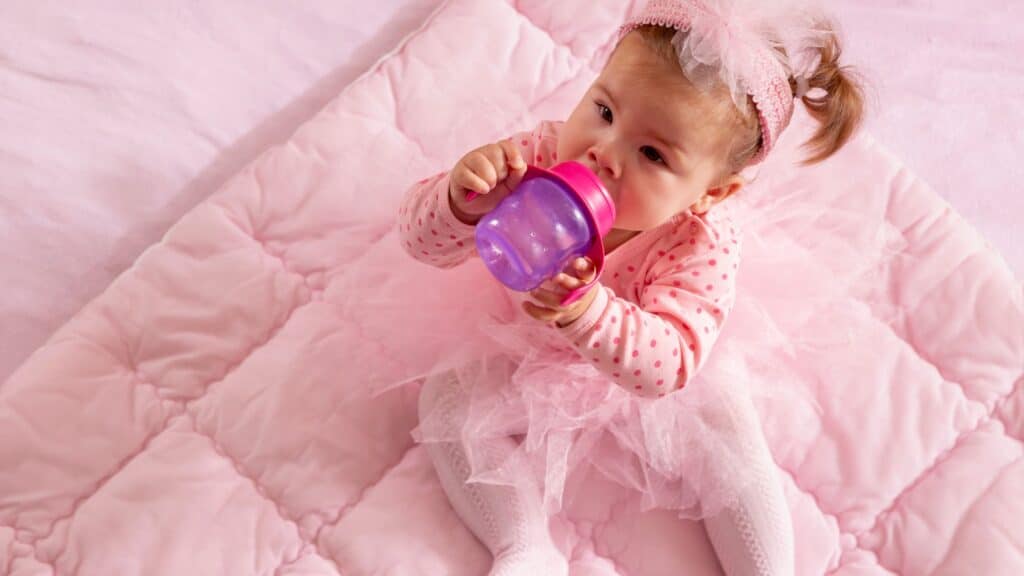
How to Introduce Water to Your Baby
Now that we’ve discussed when and how much water a baby should drink, it’s time to explore how to introduce water to your little one safely and effectively. The process of giving your baby water requires a careful balance, ensuring they stay hydrated without interfering with their breast milk or formula intake. In this column, we will offer practical tips and guidance on introducing water to your baby in a way that promotes their overall health and well-being.
Wait Until the Right Time
As previously mentioned, it’s essential to wait until your baby is around six months old and has started consuming complementary foods before introducing water. During their first six months, breast milk or formula should be their primary source of nutrition and hydration.
Start with Small Amounts
Begin by offering a few sips of water (about 2 to 4 ounces per day) from a sippy cup or a small open cup. This helps your baby get accustomed to drinking water and promotes fine motor skills. Remember, the goal is not to replace breast milk or formula but to supplement their diet and support their growing needs.
Use Safe Water Sources
Boil tap water for one minute and allow it to cool before offering it to your baby, as this will help remove any impurities and bacteria. Alternatively, you can opt for bottled baby water, which is specifically designed to be low in sodium and free of contaminants. Always consult your local health department or child’s doctor for recommendations on the best water source in your area.
Avoid Fruit Juice and Other Drinks with Added Sugar
Stick to water as the primary beverage for your baby, as fruit juice and other sugary drinks can lead to excessive sugar intake and potential dental problems. Moreover, these drinks can fill your baby’s stomach, reducing their appetite for essential nutrients found in breast milk, formula, and solid foods.
Monitor for Signs of Water Intoxication
While it’s crucial to keep your baby hydrated, be cautious not to give them too much water. Water intoxication can occur if a baby consumes excessive amounts of water, leading to an imbalance of electrolytes in the body. Look out for signs like irritability, drowsiness, or low body temperature, and always consult a healthcare professional if you have concerns.
Gradually Increase Water Intake
As your baby grows and their diet expands, you can gradually increase their water consumption. Remember to keep an eye on their hydration levels and adjust their water intake accordingly, seeking guidance from your child’s doctor if needed.
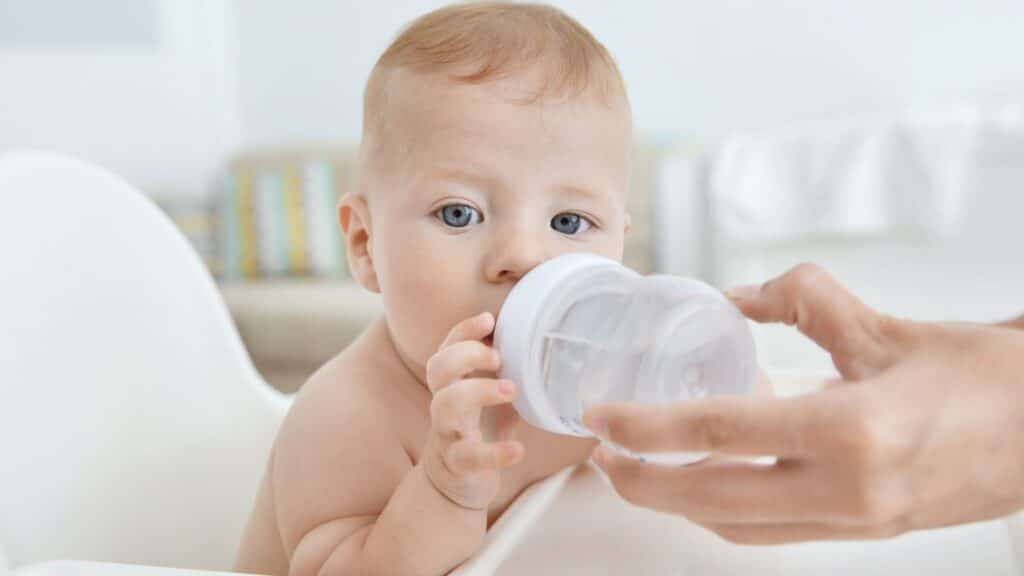
Signs of Dehydration in Babies
Dehydration can occur when a baby doesn’t receive enough fluids, such as breastmilk or formula, or loses more fluids than they take in due to illness or excessive sweating. Understanding the signs of dehydration is crucial to ensuring your little one’s health and well-being. In this column, we will outline the symptoms of dehydration in babies and provide guidance on what to do if you suspect your child may be dehydrated.
- Fewer wet diapers: A decrease in the number of wet diapers can indicate that your baby is not receiving enough fluids. A well-hydrated infant should typically have at least six wet diapers in a 24-hour period.
- Sunken fontanel: The soft spot (fontanel) on your baby’s head may appear sunken or depressed if they are dehydrated.
- Dark yellow urine: Dehydration can cause the color of your baby’s urine to darken, signifying a higher concentration of waste products.
- Dry mouth and lips: A baby’s mouth and lips may feel dry and sticky to the touch if they are not getting enough fluids.
- Tearless crying: When dehydrated, babies may cry without producing tears.
- Lethargy or irritability: Dehydrated babies may be less active than usual or become fussy and irritable.
- Sunken eyes: A baby’s eyes may appear sunken or hollow due to dehydration.
If you suspect your child may be dehydrated, taking action promptly is essential. Reach out to your child’s pediatrician for guidance on addressing the issue. They may recommend increasing your baby’s intake of breastmilk or formula, or in some cases, suggest offering an oral rehydration solution to help restore their fluid and electrolyte balance.
While providing plain water to your baby can help prevent dehydration, be cautious not to give them too much water, as this can lead to overhydration or water intoxication. As previously mentioned, introducing water should supplement your baby’s diet and not replace essential nutrients found in breastmilk or formula.
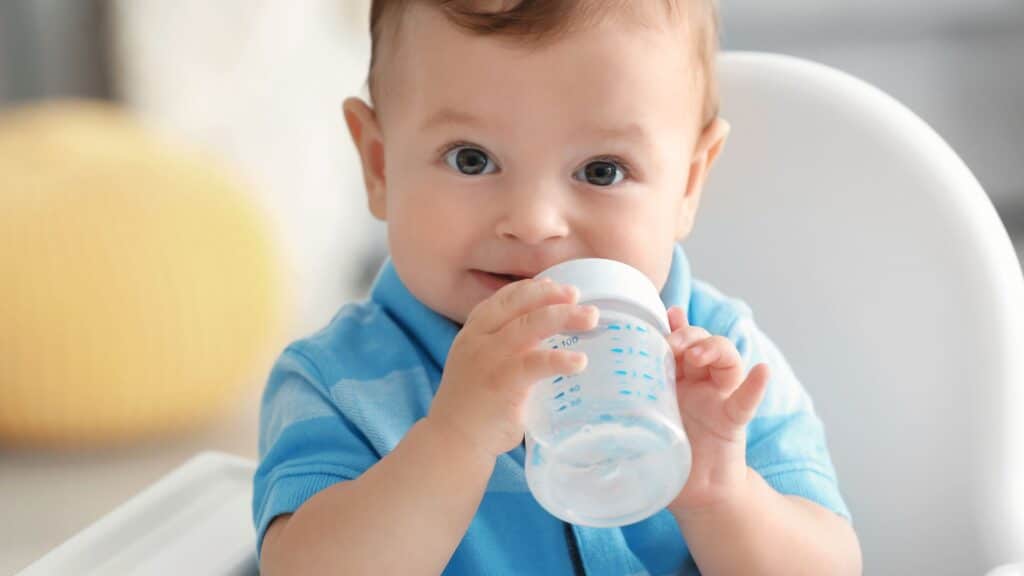
Conclusion
In conclusion, providing the right amount of baby water to your little one plays a vital role in their growth, development, and overall well-being. From understanding the appropriate age to introduce water to recognizing the signs of dehydration and ensuring proper hydration levels, each aspect contributes to a healthy and happy baby.
Baby water, specifically designed to cater to your infant’s unique needs, offers a safe and beneficial alternative to regular tap or bottled water. As a parent, staying informed and making educated decisions about your baby’s hydration will not only support their physical development but also foster lifelong healthy habits. The benefits of baby water cannot be overstated, as it contributes to a strong foundation for your little one’s bright and thriving future.
Let us know in the comments if this article was helpful to you. If you have any questions, we’d be happy to answer them!



